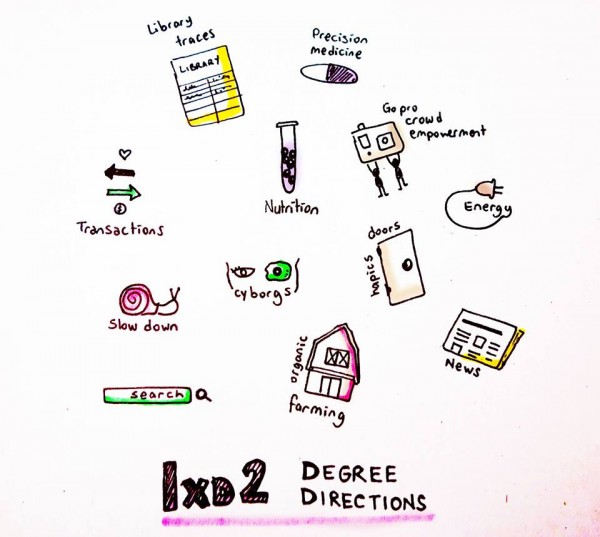Introducing IxD2 Thesis Topics
Graphic created by Ayşe Gökçe Bor.
C is for Cyborg
Where are we going with our wearable technology and what will our future look like?
Open-ended Design
What if we could design products which are flexible enough to allow the user to tinker while using it? An open-ended product promotes freedom of use, for everyone to explore their own interests niche purposes. The exploration process should be playful, focussing on the application without imposing technical constraints which require learning expert skills, which toolkits might do. Staying close to open design principles, this project proposes an alternate way for passionate users to engage with corporations to cooperate in the development process.
Social News
Jacob Cyriac
Jacob’s thesis explores changes in the style and content of news, as social media now plays an increasingly important role in its creation and distribution. How do individuals, who now have infinite choice and the ability to curate what they consume, find a balance between local, global and personal interests?
SlowGround
Slow is the new fast! Ayşe is taking an exploratory path down the slow lane and aims to inspire people to create dialogues around our paces in life. Her project process reflects the topic and she digs in to slow design and participatory design to see what “slow interaction design†may mean.
Blog: http://slowground.wordpress.com/
Organic Farming
“Food production (in Sweden) has fallen by about two percent per year over the last 30 years. If this continues, in 2053 there will be one farmer left.” Marie’s thesis aims to give the future organic farmer a product and system to help maintain control of their data that they produce, collect, and pass on.
Blog: http://mariejohansson.com/thesis.html
Tangible Nutrition
Doris’ thesis is taking a critical perspective on our interactions with food and resulting physical health. She believes the food industry and media confuses human predisposed preferences, creating the necessity for willpower and habit control, thus leading to decision fatigue on healthy food choices in our already busy lives. What if our individual physical needs are satisfied with doses of specific nutrients?
Blog: Â http://makenutritiontangible.wordpress.com/
Alternative Search
Adam is exploring alternative ways of navigating the Web. What if enhancing search tools not only relied on technological development, but exploration of potential user experiences in broader perspectives – which not only gratifies the needs for information, but supports a diversity of journeys.
Open Sesame
As doors are becoming more integrated into our digital infrastructure, we seem to shy away from physically interacting with them. Project ‘Open Sesame’  started as a question of what it is we lose in this process and what a potential role or use of touch could be in future doors. The aim is to explore how touch could add value and play a more active part in increasingly digital doors.
Library Unbound
Siri Johansson’s thesis aims to explore how the library could extend its reach and contribute to making urban life more playful and social. It will do so by considering library books as networked objects (connected to the internet) as well as networking objects (connecting people socially).
Blog: http://sirijohansson.com/thesis/
Social Money: Reimagining Transactions that build Social Capital.
Desmond Wong is investing the meaning of transactions by looking for meaning in transactions. What if social capital was currency, creating a new financial model built on relationships and trust?
Blog: http://www.desdesmond.tumblr.com
Precision Medicine: Future of Data Driven Healthcare
What if genetic and quantified self data was an integrated part of public healthcare? Shelagh McLellan’s thesis aims to provide a vision of precision medicine and the future of data driven healthcare services.
Blog: http://precisionmedicine.wordpress.com/
Karey’s thesis aims to critique and challenge society’s relationship with energy by asking “What if you were required to produce all energy you desire to consume?
Blog: http://www.kareyhelms.com/blog/
Remember to follow the Interaction Design Programme Facebook page for fresh updates from Umeå


